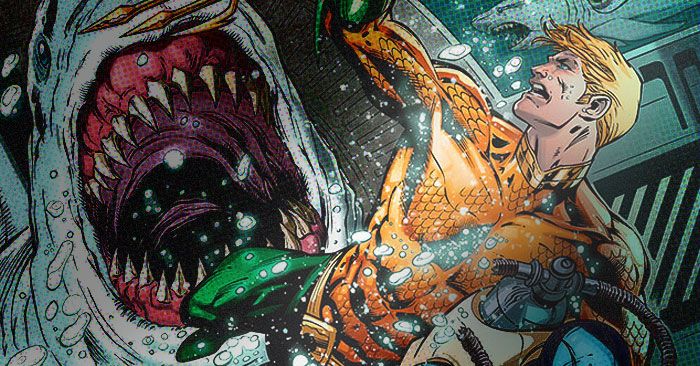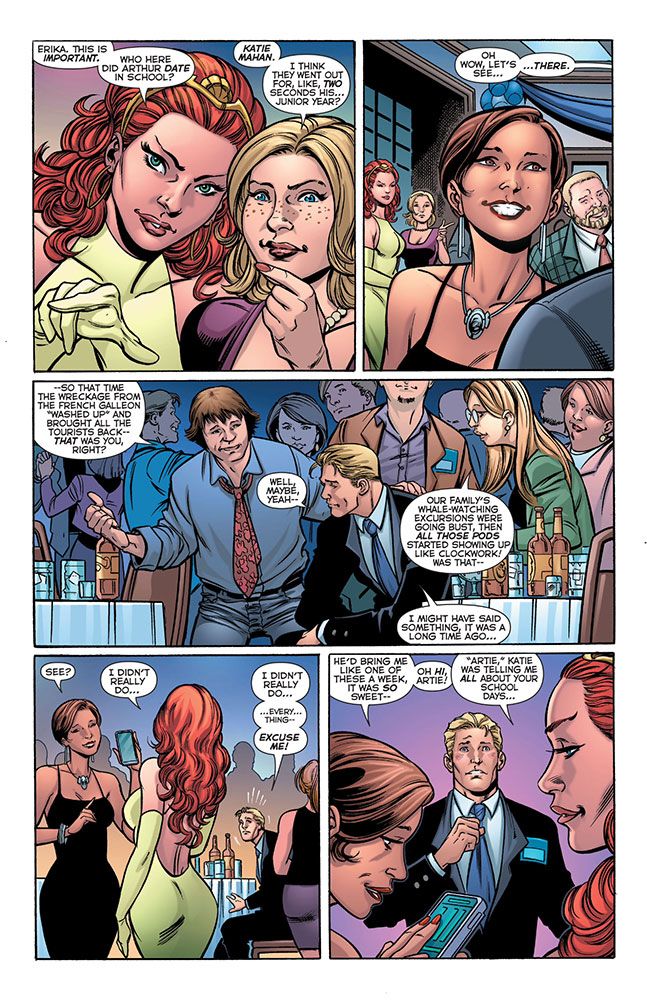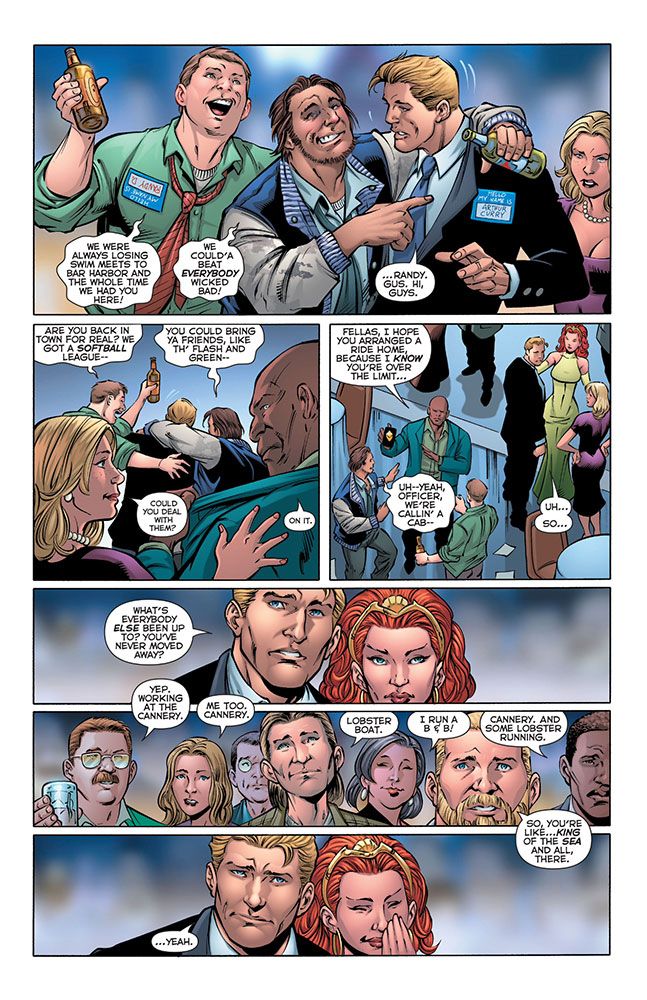I don't care about Aquaman.
At least, that was the notion that I operated under for the first two decades of my comic book buying life. I never picked up an Aquaman comic and I never even felt the urge to do so. Even when DC Comics tried its hardest to make Arthur Curry as edgy as they could in the '90s, they could not entice me to spend my parents' money on his comic book. No amount of beards or hook hands or shirtlessness could get me to buy that book. I just didn't care.
As far as I could tell, I already had an Aquaman popping up in the books I read. To me, Aquaman was just a second rate Namor, just an Atlantean king without all of Namor's trademark snobbery. And truthfully, I'm barely even interested in Namor -- yes, even after he was forced into my beloved X-Books over the past half decade. So if I don't care about Namor, how in the world would anyone ever expect me to care about Aquaman?
Last week's "Aquaman" #28 finally answered that question: you get Jeff Parker to write him.
I'm a big Jeff Parker fan. I initially fell in love with his work during his lengthy "Thunderbolts" run, where he took a concept and series that I had pretty much written off and turned it into the best team book in comics starring characters that I now have a strong emotional bond with. I will forever follow characters like Man-Thing and Boomerang to whatever new books they appear in solely because Parker -- alongside artists Kev Walker and Declan Shalvey -- made me love them. I followed Parker to his other Marvel work, like "Hulk" and the old "Age of the Sentry" limited series. I picked up his independent work, books like the claustrophobically noir "Underground" and the Faygo-flavored mystery/comedy "Bucko," and loved those too. He moved over to DC Comics to write "Batman '66" and, well, I've already written about what that project means to me.
Basically, Jeff Parker has a resume that this aspiring writer is incredibly jealous of. He's been able to write A-List characters at a big publisher while also doing in-depth and long-term work on C-List ones, making it so that an entire generation of readers will forever be mad that this current version of Satana isn't Jeff Parker's version of Satana. On top of that, the guy's been able to pursue his own independent projects while being able to cut his imagination loose on an I-can't-believe-this-exists series like "Batman '66." I dream of having a bibliography even half as diverse and fun-filled as Parker's, if only because I really think I can make readers care deeply for C-Listers like Maggott and Boom Boom (I'm readying my pitch, Marvel, I know you're interested now!). So when I heard he was taking over "Aquaman," my first thought was, "well, I guess I have to care about Aquaman now."
"Not so fast, Brett," my brain voice whispered in my ear, which was not hard because my brain and ears are very close to each other. "You still have to buy and read Aquaman comics! You know nothing about Aquaman! In fact, the only things you know about Aquaman you learned from a podcast dedicated to celebrating/mocking Golden Age Aquaman stories! You know way more about Topo the octopus than is probably relevant to modern Aquaman stories!" True, brain voice, true.
The first two issues of Jeff Parker's "Aquaman" were good. They delivered the kind of imaginative super hero action sequences that I've come to expect from Parker, and I've also enjoyed Paul Pelletier's art. Still, something was missing from the title, and I had yet to really find my sea legs. It turns out that all I needed to get on board was for Aquaman to go to his high school reunion, like he did in last week's "Aquaman" #28.
I don't know what longtime Aquaman readers thought about the reunion half of that issue. I don't know if the pre-New 52 or pre-Crisis Aquaman even went to high school. All I know is that, for me, that one sequence told me more about Aquaman and what makes him unique than any sea monster brawl ever could. I now know that Art Curry is a man of two worlds, which definitely sets him apart from the fish-focused Namor. He grew up on land but now rules under the sea. His identity has become public knowledge, meaning that his high school girlfriend and the bullies that used to rag on him now view their youth together differently. The issue includes a montage of Curry's adult classmates wanting to know if Aquaman secretly saved them from water-based peril.
This specific sequence resonated with me so much because it feels inspired by one of the basic fundamental teachings of long form improvisational comedy -- "if this is true, then what else is true." All to often, it feels like super hero comics don't take the "what else is true" part of that equation past how it relates to action plots. "If the Avengers are Earth's mightiest heroes, then what happens when you take them off of Earth?" In that high school reunion sequence, Parker takes Aquaman's unique origin -- he was raised as human but now has a whole undersea civilization under his care -- and extrapolates it to find out how that would affect him personally instead of physically. As a result, we get to see a high school reunion featuring a returning Atlantean king, where drunken classmates ask him to join their softball team. That's a fun use of the character's origin, and it's one that has me finally invested in a character I previously knew nothing about.
I love seeing stories like this in super hero comics. As a kid, I definitely learned way more about the X-Men in their quiet, breather issues than I ever did while they were fighting Sentinels. But after learning more about them in those issues, I became way more invested in the battles that followed. The more I know about a character, the more I see their individuality, the more likely I am to freak out when they're placed in jeopardy. For example, Parker could now really mess with my emotions by placing any one of Arthur's classmates in peril. Just a few pages of exposure and I like all those people, and I like the friendly-yet-reluctant way that Aquaman relates to them.
This is just further proof that there are no bad or inherently uninteresting characters. The right writer with the right take can make any character relatable, and Jeff Parker seems to have done that with Aquaman. A year ago, I never would have guessed that I would be reading "Aquaman," but the me from one year ago would have also known better than to doubt the power of Parker.
Brett White is a comedian living in New York City. He co-hosts the podcast Matt & Brett Love Comics and is a writer for the comedy podcast Left Handed Radio. His opinions can be consumed in bite-sized morsels on Twitter (@brettwhite).



